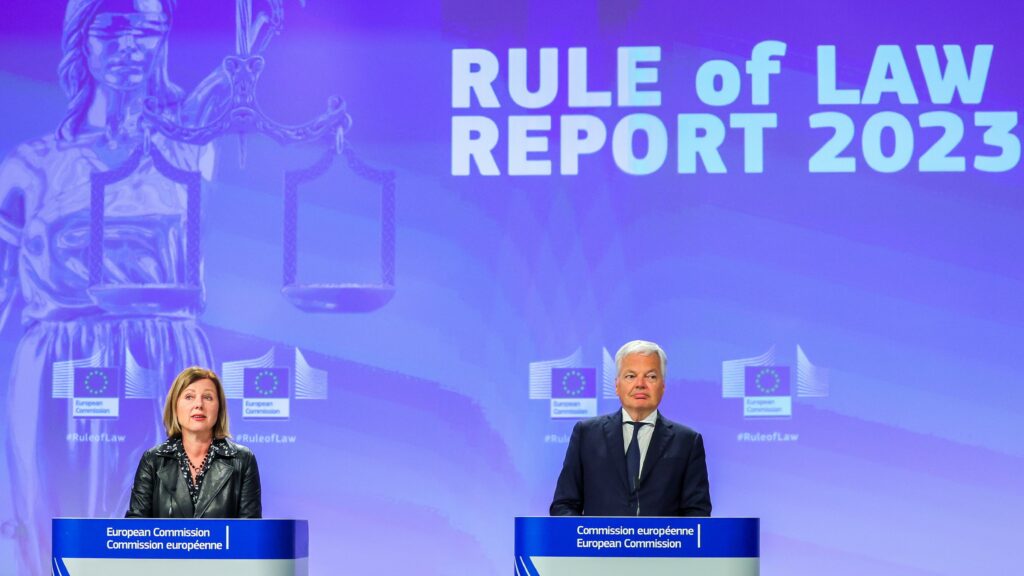The https://english.atlatszo.hu use cookies to track and profile customers such as action tags and pixel tracking on our website to assist our marketing. On our website we use technical, analytical, marketing and preference cookies. These are necessary for our site to work properly and to give us inforamation about how our site is used. See Cookies Policy
Multiple Atlatszo stories referenced in annual EU rule-of-law report
Last week, the European Commission published the latest Rule of Law Report, which examines the state of the rule of law in each Member State. It shows some progress in Hungary, but there is still plenty of room for improvement, especially in the sector of media. The report also cites stories by Atlatszo, which dealt with the government’s actions during COVID-19, companies consistently winning public procurement contracts in Győr, and the most well-known cases stuck in the investigative authority.
This is the fourth year that the European Commission has published its Rule of Law Report, which examines how each Member State is performing in terms of the rule of law (justice system, anti-corruption framework, media pluralism, and other institutional issues related to checks and balances.) and then makes recommendations to them. This year’s chapter on Hungary concludes that some progress has been made in areas relevant to access to withheld EU funds, such as anti-corruption – like the establishment of the Integrity Authority, in whose anti-corruption working group Atlatszo is also involved – but many more steps are needed.
However, the report also says that there are areas where little has changed since last year, such as press freedom, and media pluralism, where the independence of public service media and the transparent allocation of public advertising still need to be established. They also mention the smear campaigns against independent newspapers and the interception and surveillance of journalists. But the situation for NGOs is no easier and there is still room for improvement in the area of asset declarations.

Failed investigations, coronavirus, public procurements
The nearly 50-page report refers to Átlátszó multiple times, and the document mentions three of our stories as well.
One of them is our story published in 2021, in which we collected the major cases in which either the investigation has been stalled for a long time without results or, on the contrary, the Hungarian investigative authority closed the case quickly “for lack of criminality”. We also found cases where they simply did not start investigating. Examples include the Öveges programme, which was originally intended to improve science education, or the Elios case, linked to the former company of István Tiborcz, the son-in-law of the Prime Minister.
The report also quoted our story on the Hungarian public procurement system. In it, we revealed that the unnamed city in the study published by the Budapest Corruption Research Centre, where three companies consistently won public procurement contracts is none other than Győr. The companies are STRABAG General Construction Ltd., KIFÜ-KAR Zrt. and VILL-KORR HUNGÁRIA Villamosipari Kft.
The third Átlátszó story in the report was about the first report of the K-Monitor and TASZ corruption watchdog programme, to which Katalin Erdélyi, Deputy Editor-in-Chief of Átlátszó, also contributed. The report found, among other things, that the Hungarian government’s actions during the COVID-19 pandemic served to strengthen its own power, benefit its economic holdings, and reduce the room for manoeuvre of its political opponents.
The government mentions double standards
The findings of the rule of law report have not been met with unanimous success in government circles.
Balázs Hidvéghi, Fidesz MEP, commented that the document applies double standards and is “based on false findings of civil society organisations”, so it is not suitable to paint an unbiased picture of the rule of law situation in the Member States. The Governmental Information Centre’s statement directly implied that Hungary “was being attacked” because
“we do not join the pro-war side. We do not want migrant ghettos. We refuse to abolish the cuts in rationing. We dare to ask the European Commission where all the money that was given to Ukraine is. Perhaps they gave them the money of the Hungarians?”
Written and translated by Zita Szopkó. The original, Hungarian version of this story can be found here. Cover photo: Brussels, 5 July 2023.Vera Jourová, Vice-President of the European Commission (l), and Didier Reynders, Commissioner for Justice, at a press conference after the weekly meeting of the Commission on the fourth edition of the report on the rule of law, in Brussels, 5 July 2023. MTI/EPA/Olivier Matthys
Share:
Your support matters. Your donation helps us to uncover the truth.
- PayPal
- Bank transfer
- Patreon
- Benevity
Support our work with a PayPal donation to the Átlátszónet Foundation! Thank you.
Support our work by bank transfer to the account of the Átlátszónet Foundation. Please add in the comments: “Donation”
Beneficiary: Átlátszónet Alapítvány, bank name and address: Raiffeisen Bank, H-1054 Budapest, Akadémia utca 6.
EUR: IBAN HU36 1201 1265 0142 5189 0040 0002
USD: IBAN HU36 1201 1265 0142 5189 0050 0009
HUF: IBAN HU78 1201 1265 0142 5189 0030 0005
SWIFT: UBRTHUHB
Be a follower on Patreon
Support us on Benevity!

